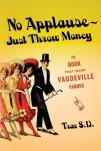
I’m going through a Gilbert and Sullivan phase at the moment, working on an operatic homage to them with composer David Mallamud and immersing myself in their work. In my thirties, my heroes had been Shaw and Wilde, provocative essayists both, rebels against all things Victorian, and sterling and stalwart champions of the comedy as a vehicle for ideas. My aspiration at the time was to be a sort of libertarian step-child to them, although I never quite found a way to make my essays match my plays, and vice versa. (In retrospect, come to think of it, that never stopped Shaw or Wilde; the relationship between their prose and drama is often just as mysterious). As I steep myself in W.S. Gilbert (1836-1911), who came along a couple of decades earlier, however, I begin to realize that neither Shaw nor Wilde would have been possible if Gilbert hadn’t blazed the trail before them. At first glance, Gilbert may seem a mere formalist, a farceur, but the reality is that his was a keenly satirical mind, mixing his discontent in regard to human folly with heady doses of nonsense in a manner reminiscent of Aristophanes and Lewis Carroll. One of those delicious ironies: while the Germans and Italians brought the opera to its greatest heights by exploring the depths of tragedy, England’s best loved operas (with the possible exception of Yeomen of the Guard) are comedies. Sir Arthur Sullivan (1842-1900) was all too keenly aware of this, of course. It formed the basis of his rocky relationship with Gilbert. The prejudice persists to this day. As an example, one of the most useful reference books for the theatre critic, Henry W. Simon’s 100 Great Operas and Their Stories, contains no entries on Gilbert and Sullivan operas. Just because even Sir Arthur Sullivan didn’t believe in what he was doing, however, doesn’t mean he was correct on that score.
Even more glorious (and deceptive) is the rich intersection of G & S opera with popular culture. Once upon a time, opera WAS popular culture. European nationals were proud of their theatrical “airs” and could whistle them like you can whistle Lady Gaga. Gilbert and Sullivan’s patter songs have more than a little of the music hall about them. They appealed to every stratum of their culture. So much so in fact that the team had an impact on American vaudeville, and that is the real reason for my post. In a very real sense, vaudeville was built on Gilbert and Sullivan. In Boston, Keith and Albee, the builders of the nation-wide vaudeville chain that was to define Big Time vaudeville for the bulk of its existence, had their first theatrical success presenting a pirated, truncated production of The Mikado underselling their local opera house, and amassing enough profit to expand their enterprise to include variety artists. In New York in 1881, music hall impresario Tony Pastor tried presenting a parody of The Pirates of Penzance called The Pie-rats of Pen Yan. It wasn’t a smash, but it did showcase a woman he was to build up into a major star of both variety and the legit stage, Lillian Russell. (She’d earlier been in a production of H.M.S. Pinafore.) Other Gilbert and Sullivan veterans in vaudeville included DeWolf Hopper, Marie Dressler,and Faye Templeton.
By the turn of the twentieth century, the Gilbert and Sullivan craze was burning itself out in favor of newer voices like Victor Herbert. But their influence carried on. It’s present in some of the very best twentieth century songwriters, like Noel Coward, Cole Porter, Rodgers and Hammerstein, Harold Arlen and Y.I.P. Harburg, and Kalmar and Ruby (who wrote all those great songs for the Marx Brothers). Groucho was a lifelong G & S. fan. So much so that, after years of singing along to their records, in 1960 he appeared as Ko-Ko in a television version of The Mikado.
Who are the foremost heirs to W.S. Gilbert today? The best patter songs these days come from hip hop and it’s been that way for decades.
To find out more about the history of vaudeville, consult No Applause, Just Throw Money: The Book That Made Vaudeville Famous, available at Amazon, Barnes and Noble, and wherever nutty books are sold.


[…] animals that composed the museum’s menagerie. Then he proposed that they take advantage of the Gilbert and Sullivan craze that was still sweeping the U.S., by offering pirated productions of the plays at a fraction […]
LikeLike